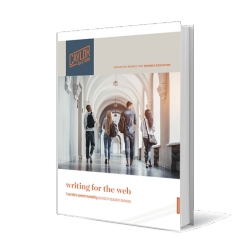The Hidden ROI of AI in Higher Ed Marketing Campaigns
Explore the real ROI of AI in higher ed marketing—from faster content to better targeting and smarter budget use.
Marketing Strategies
Every higher ed marketer would love to have a brand as recognizable as Harvard Business School. But what is it really like?
Most colleges and universities can only dream of having an (almost) billion-dollar operation that is Harvard Business School.
They were the first to offer a master’s in business administration. Each year, they teach approximately 12,000 executives and have an online school with an enrollment in the tens of thousands.
Alongside of their educational program, they run a prestigious publishing arm with the Harvard Business Review.
The name recognition of a brand with that kind of clout is almost unimaginable!
So on our 50th episode of The Higher Ed Marketer podcast, my co-host, Troy Singer, and I invited Brian Kenny, the Chief Marketing and Communications Officer for Harvard Business School, to talk to us about what it’s really like to market for a brand like Harvard.
Yes, Harvard is a historic brand, and that might lead some to believe that it markets itself, but it turns out history can sometimes be a double-edged sword.
In this milestone episode, we talk with Brian about the challenges of managing a well-known brand, including how to balance being seen as both historic and forward-thinking.
We spoke with Brian about how he is leveraging his podcast as a way to promote the Harvard Business School brand.
For him, podcasting is a great way to humanize such an institutional brand.
My job is to tell stories that animate the mission of the school and the work of the school. Part of that is bringing the voices of people who are doing the work to the surface. When I say voices, I can mean that literally, or I can mean it in writing or in other ways.
Podcasts are a great way to humanize somebody.
For a long time, there was a mystique about Harvard Business School, and that worked for probably the first 80 or 90 years of our existence. But we live in a time where people want transparency. They want access. Social media has made that available.
The things that faculty and students at HBS do are very impressive and very ambitious, and they are changing the world in many ways! But at the same time, these are just people.
When you hear them talk about the business cases they write and the work that they do, it really brings it right down to earth and humanizes them and knocks away a lot of the mystique that maybe creates a barrier between us and the public.
As you market to more younger generations, “mystique” becomes more and more of a deficit for higher ed brands.
Today’s Gen Z and the coming Generation Alpha students prize authenticity and transparency.
During our conversation, we were able to touch on a potentially sensitive topic that absolutely every higher ed marketer wants to ask.
What is it like to market for a high-visibility brand like Harvard?
Come to find out, as a brand, Harvard has its own perception challenges to overcome. Brian calls it the “H-bomb.”
The H-bomb phenomenon is something that Harvard alumni speak about pretty regularly. It boils down to people who are affiliated with Harvard, whether it’s faculty, alumni, students or staff, they’re always a little careful how they introduce that credential into a conversation.
The Harvard brand, although it is well known and well respected in most circles, is also viewed negatively. In a lot of ways, people think about it as an elitist brand. They think that people who are part of Harvard University are intellectual elites; that they’re arrogant, greedy, and self-centered. I understand those perceptions exist.
A big part of my job is to help knock down those misperceptions about what it’s like being at Harvard.
We are an elite institution, and that’s important as a big part of our identity. But we’re not elitist.
We want the best people from around the world to come and study and work and teach at Harvard Business School. For us, it’s very important to have as diverse a group as possible, and that means diversity in every realm. It’s important for us to continue to work on helping anybody who hears about us to [be able to] see themselves at Harvard Business School.
What I enjoyed about talking to Brian is how clearly he understands the misconceptions people have about the Harvard Business School brand.
This keen awareness of his audience and their emotional reaction to the Harvard brand helps him create more inclusive brand messaging while maintaining the feeling of excellence.
At the end of the day, it’s about managing that tension between who you are, what you’re known for, and what that student needs.
And that tension is something any school – whether it’s a large, elite school, like Harvard Business School, or a small, private one with fewer than 100 students – will have to manage.
Like all of our blog post reviews of The Higher Ed Marketer podcasts, there’s so much more to learn in the podcasts themselves.
Listen to our interview with Brian Kenny to get even more insights into:
Then you’ve got to know how to write for the web. That’s why we want to send you our popular ebook: Writing for the Web: 7 Secrets to Content Marketing Success for Education Marketers!
With this helpful resource, you’ll learn how to:
In short, you’ll be able to write the copy that makes your digital marketing strategy work for you. Download your copy today!
Featured image via hbs.edu
Subscribe to The Higher Ed Marketer podcast today!